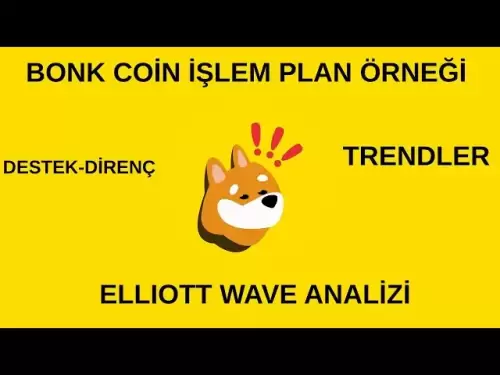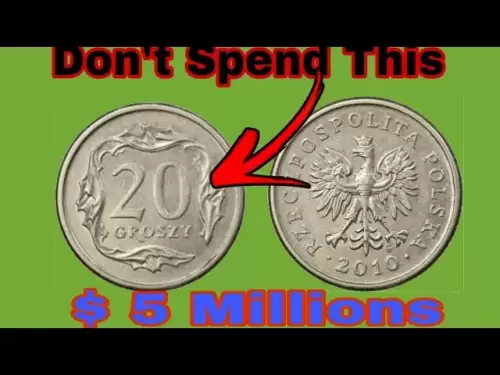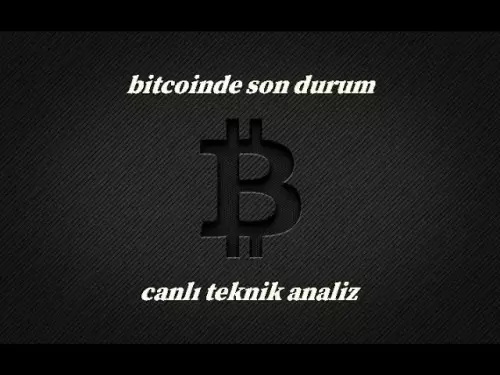-
 Bitcoin
Bitcoin $108,562.4295
0.46% -
 Ethereum
Ethereum $2,533.9553
1.52% -
 Tether USDt
Tether USDt $1.0002
-0.01% -
 XRP
XRP $2.2542
2.23% -
 BNB
BNB $662.4567
1.48% -
 Solana
Solana $151.4114
3.48% -
 USDC
USDC $0.9999
0.00% -
 TRON
TRON $0.2860
0.91% -
 Dogecoin
Dogecoin $0.1685
3.72% -
 Cardano
Cardano $0.5809
1.63% -
 Hyperliquid
Hyperliquid $39.2916
1.85% -
 Sui
Sui $2.8874
0.85% -
 Bitcoin Cash
Bitcoin Cash $496.5801
2.72% -
 Chainlink
Chainlink $13.3582
2.48% -
 UNUS SED LEO
UNUS SED LEO $9.0279
0.07% -
 Avalanche
Avalanche $18.0773
2.30% -
 Stellar
Stellar $0.2426
3.05% -
 Toncoin
Toncoin $2.9086
6.01% -
 Shiba Inu
Shiba Inu $0.0...01170
2.97% -
 Hedera
Hedera $0.1587
3.47% -
 Litecoin
Litecoin $87.4596
1.13% -
 Monero
Monero $317.0425
0.73% -
 Polkadot
Polkadot $3.3778
1.90% -
 Dai
Dai $0.9999
-0.01% -
 Ethena USDe
Ethena USDe $1.0001
-0.01% -
 Bitget Token
Bitget Token $4.4095
0.63% -
 Uniswap
Uniswap $7.3593
6.80% -
 Pepe
Pepe $0.0...09910
3.64% -
 Aave
Aave $274.7388
2.68% -
 Pi
Pi $0.4607
0.48%
What is the role of a private key in a smart contract?
Private keys authorize smart contract interactions by signing transactions; the contract itself doesn't hold the key. Losing it means irreversible loss of access to associated funds and smart contract functions.
Mar 22, 2025 at 07:28 am
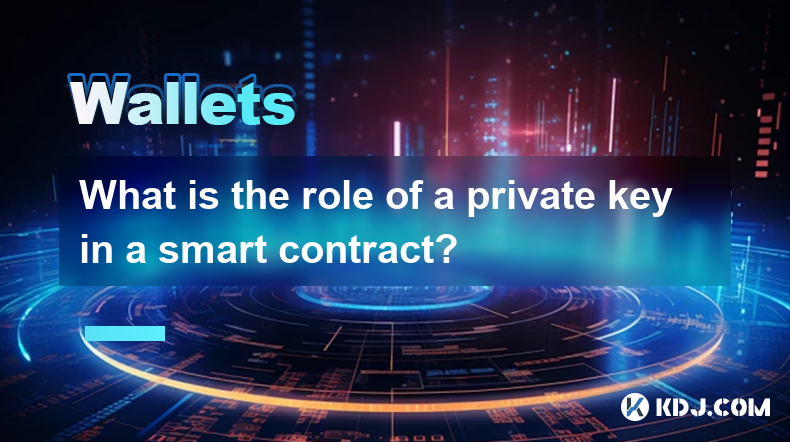
Key Points:
- Private keys are not directly used within a smart contract. Their role is crucial before and after interaction with a smart contract.
- Smart contracts operate on the blockchain using public keys and addresses derived from private keys.
- Private keys are essential for authorizing transactions that interact with smart contracts, granting permission to execute specific functions.
- The security of funds and the integrity of smart contract interactions depend entirely on the secure management of private keys.
- Loss or compromise of a private key leads to irreversible loss of control over assets interacting with a smart contract.
What is the role of a private key in a smart contract?
Private keys don't reside within a smart contract itself. Instead, they play a crucial, albeit indirect, role in the entire process of interacting with smart contracts. Think of it this way: the smart contract is a program running on the blockchain; the private key is the digital signature that allows you to instruct that program. It's the authentication mechanism enabling you to interact with the code.
The smart contract operates using public keys and addresses. These are derived mathematically from the private key. Your public key is essentially your publicly visible identifier on the blockchain, akin to your bank account number. Transactions interacting with a smart contract are signed using the private key, proving that you own the corresponding public key and therefore have the authority to interact with the contract.
For instance, if you want to send cryptocurrency to a smart contract (e.g., participating in a decentralized finance (DeFi) protocol), your private key is used to sign the transaction. This signature verifies your ownership of the funds and authorizes the smart contract to execute the transfer. Without this signature, the transaction would be invalid and rejected by the network.
Similarly, if a smart contract allows you to perform actions such as voting, withdrawing funds, or changing parameters, you'll need your private key to sign the transaction that initiates these actions. The smart contract then verifies this signature to ensure that the request originates from an authorized user.
Therefore, while not directly "inside" the smart contract code, the private key is the essential component that grants you access and control over your interaction with it. Its role is entirely about authorization and authentication of transactions. It's the key that unlocks your ability to use and manage your assets within the smart contract's environment. Losing or compromising your private key means losing complete control over your assets and your ability to interact with any smart contract associated with that address.
This highlights the paramount importance of securely storing your private keys. Never share them with anyone, and always use reputable hardware or software wallets designed for secure key management. The security of your cryptocurrency and your interaction with smart contracts rests entirely on the secure handling of your private keys.
How does a private key interact with a smart contract's functions?
The interaction isn't direct. The process involves a few steps:
- Transaction Initiation: You initiate a transaction through a wallet or dapp interface. This transaction specifies the smart contract function you want to call and any necessary parameters (e.g., amount of cryptocurrency to transfer, voting choice, etc.).
- Signature Generation: Your wallet uses your private key to cryptographically sign the transaction. This signature proves that you authorize the transaction.
- Transaction Broadcasting: The signed transaction is broadcast to the blockchain network.
- Verification and Execution: Nodes on the network verify the signature using your corresponding public key. If the signature is valid, the smart contract executes the requested function.
What happens if I lose my private key?
Losing your private key is equivalent to losing access to the funds associated with that key. Since private keys are used to authorize all transactions, losing it means you can no longer interact with any smart contracts connected to that address. Your funds are effectively locked, and there's no recovery mechanism. This underscores the critical importance of meticulous private key management.
What are the security implications of private keys in smart contract interactions?
The security of your interactions with smart contracts is entirely dependent on the security of your private keys. Compromised private keys can lead to theft of funds, unauthorized execution of smart contract functions, and loss of control over your assets. Strong security practices, including using hardware wallets, strong passwords, and avoiding phishing scams, are crucial for protecting your private keys and safeguarding your funds.
Can I recover my private key if I lose it?
No. Private keys are cryptographically generated and are not recoverable. The security model relies on the irretrievability of these keys. Therefore, losing your private key results in the permanent loss of access to the associated funds and smart contract interactions.
How do I securely store my private key?
Secure storage is crucial. Consider using a hardware wallet, which stores your private keys offline, offering significantly enhanced protection against hacking and malware. If using software wallets, ensure they are from reputable providers and keep your device secure with strong passwords and up-to-date security software. Never share your private key with anyone, and be wary of phishing attempts.
Disclaimer:info@kdj.com
The information provided is not trading advice. kdj.com does not assume any responsibility for any investments made based on the information provided in this article. Cryptocurrencies are highly volatile and it is highly recommended that you invest with caution after thorough research!
If you believe that the content used on this website infringes your copyright, please contact us immediately (info@kdj.com) and we will delete it promptly.
- Drake, Bitcoin, and Mainstream Music: A New Era?
- 2025-07-07 12:30:12
- Meme Coins, ROI Potential, 2025 Selection: What's Hot and What's Not?
- 2025-07-07 12:30:12
- Bitcoin, Ethereum, and Dogecoin: Navigating the Crypto Landscape in a Wild Week
- 2025-07-07 12:50:11
- Meme Coin Mania: Explosive Picks and Top Buys in 2025
- 2025-07-07 12:50:11
- Bitcoin, Ethereum, and the Cryptocurrency Market: Riding the Wave of Innovation
- 2025-07-07 12:55:12
- Elon Musk, Bitcoin, and Crypto News: A 2025 Perspective
- 2025-07-07 13:10:12
Related knowledge

How to cancel a pending transaction in Phantom wallet?
Jul 03,2025 at 07:21pm
Understanding Pending Transactions in Phantom WalletA pending transaction in the Phantom wallet occurs when a user initiates a transfer or interaction with the Solana blockchain, but it hasn't yet been confirmed by the network. This can happen due to various reasons such as low transaction fees, network congestion, or incorrect gas settings. It's import...

How to see the estimated value of my tokens in Phantom wallet?
Jul 04,2025 at 12:21am
What is Phantom Wallet?Phantom wallet is one of the most popular cryptocurrency wallets designed for the Solana blockchain. It allows users to store, send, receive, and manage various tokens built on Solana, including SPL tokens and NFTs. The wallet offers a user-friendly interface, making it accessible for both beginners and advanced users in the crypt...

How to lock my Phantom wallet extension?
Jul 03,2025 at 11:14am
What Is the Phantom Wallet and Why Lock It?The Phantom wallet is a popular non-custodial cryptocurrency wallet designed for interacting with the Solana blockchain. Supporting both browser extensions and mobile apps, Phantom allows users to store, send, receive, and stake SOL tokens, as well as interact with decentralized applications (dApps). Securing y...

Does Phantom wallet offer two-factor authentication (2FA)?
Jul 03,2025 at 09:00am
Understanding Phantom Wallet and Its Security FeaturesPhantom wallet is a widely used non-custodial cryptocurrency wallet that supports the Solana blockchain. It allows users to store, send, receive, and interact with decentralized applications (dApps) seamlessly. As security is a top priority for any crypto wallet user, security features like two-facto...
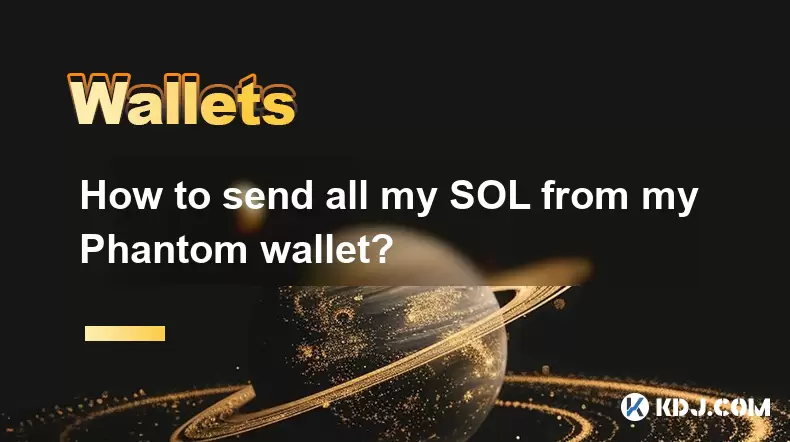
How to send all my SOL from my Phantom wallet?
Jul 06,2025 at 10:00am
Preparing to Send SOL from Your Phantom WalletBefore initiating any transaction, it is crucial to ensure that your Phantom wallet is fully set up and connected to the correct network. Phantom supports multiple networks, but for sending SOL, you must be on the Solana blockchain. Confirm this by checking the network indicator in the top-right corner of th...

What is "rent" on Solana and how does it affect my Phantom wallet?
Jul 02,2025 at 08:35pm
Understanding 'Rent' on SolanaIn the context of Solana, the term 'rent' refers to a storage fee that users pay for maintaining data on the blockchain. Unlike Ethereum, where storage costs are paid once via gas fees during contract deployment, Solana implements a recurring cost model to ensure efficient usage of network resources. This means that any acc...

How to cancel a pending transaction in Phantom wallet?
Jul 03,2025 at 07:21pm
Understanding Pending Transactions in Phantom WalletA pending transaction in the Phantom wallet occurs when a user initiates a transfer or interaction with the Solana blockchain, but it hasn't yet been confirmed by the network. This can happen due to various reasons such as low transaction fees, network congestion, or incorrect gas settings. It's import...

How to see the estimated value of my tokens in Phantom wallet?
Jul 04,2025 at 12:21am
What is Phantom Wallet?Phantom wallet is one of the most popular cryptocurrency wallets designed for the Solana blockchain. It allows users to store, send, receive, and manage various tokens built on Solana, including SPL tokens and NFTs. The wallet offers a user-friendly interface, making it accessible for both beginners and advanced users in the crypt...

How to lock my Phantom wallet extension?
Jul 03,2025 at 11:14am
What Is the Phantom Wallet and Why Lock It?The Phantom wallet is a popular non-custodial cryptocurrency wallet designed for interacting with the Solana blockchain. Supporting both browser extensions and mobile apps, Phantom allows users to store, send, receive, and stake SOL tokens, as well as interact with decentralized applications (dApps). Securing y...

Does Phantom wallet offer two-factor authentication (2FA)?
Jul 03,2025 at 09:00am
Understanding Phantom Wallet and Its Security FeaturesPhantom wallet is a widely used non-custodial cryptocurrency wallet that supports the Solana blockchain. It allows users to store, send, receive, and interact with decentralized applications (dApps) seamlessly. As security is a top priority for any crypto wallet user, security features like two-facto...

How to send all my SOL from my Phantom wallet?
Jul 06,2025 at 10:00am
Preparing to Send SOL from Your Phantom WalletBefore initiating any transaction, it is crucial to ensure that your Phantom wallet is fully set up and connected to the correct network. Phantom supports multiple networks, but for sending SOL, you must be on the Solana blockchain. Confirm this by checking the network indicator in the top-right corner of th...

What is "rent" on Solana and how does it affect my Phantom wallet?
Jul 02,2025 at 08:35pm
Understanding 'Rent' on SolanaIn the context of Solana, the term 'rent' refers to a storage fee that users pay for maintaining data on the blockchain. Unlike Ethereum, where storage costs are paid once via gas fees during contract deployment, Solana implements a recurring cost model to ensure efficient usage of network resources. This means that any acc...
See all articles























